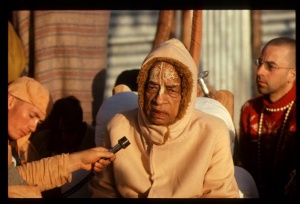SB 11.30.1

A.C. Bhaktivedanta Swami Prabhupada
Please note: The synonyms, translation and purport of this verse were composed by disciples of Śrīla Prabhupāda
TEXT 1
- śrī-rājovāca
- tato mahā-bhāgavata
- uddhave nirgate vanam
- dvāravatyāṁ kim akarod
- bhagavān bhūta-bhāvanaḥ
SYNONYMS
śrī-rājā uvāca — the king said; tataḥ — then; mahā-bhāgavate — the great devotee; uddhave — Uddhava; nirgate — when he had gone; vanam — to the forest; dvāravatyām — in Dvārakā; kim — what; akarot — did; bhagavān — the Supreme Personality of Godhead; bhūta — of all living beings; bhāvanaḥ — the protector.
Translation and purport composed by disciples of Śrīla Prabhupāda
TRANSLATION
King Parīkṣit said: After the great devotee Uddhava left for the forest, what did the Supreme Personality of Godhead, the protector of all living beings, do in the city of Dvārakā?
PURPORT
Parīkṣit Mahārāja now inquires from Śukadeva Gosvāmī about the topic of Chapter One of this canto, namely the annihilation of the Yadu dynasty and Lord Kṛṣṇa's return to the spiritual sky. Because Lord Kṛṣṇa was playing the part of an ordinary member of the Yadu dynasty, He appeared to react to the curse of the brāhmaṇas by giving up His earthly pastimes. Lord Kṛṣṇa cannot actually be cursed by anyone. Nārada Muni and the other sages who cursed the Yadu dynasty are eternal devotees of Lord Kṛṣṇa and could hardly curse Him. Therefore, in giving up His pastimes and leaving the earth with the Yadu dynasty, Lord Kṛṣṇa demonstrated His internal potency and personal will, since no one can challenge the supreme potency of the Personality of Godhead.